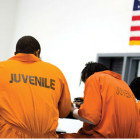
The academic year has started at the law school where I teach third-year students advocacy skills and legal doctrine in the area of juvenile courts and delinquency. At the beginning of each semester, I meet individually with each of my students in the Juvenile Justice Clinic to get a sense of their backgrounds, interests, and expectations. I answer their questions and try to assuage their concerns, for within a matter of weeks they will be traveling to unfamiliar neighborhoods for client interviews, learning North Carolina criminal law and procedure, and appearing in juvenile delinquency court for motions and hearings. In one recent conversation, I used the phrase, “It’s a small world,” when a student mentioned someone I had known decades ago. “Actually,” he replied, with a half-smile, “it’s not a small world; it’s just a poorly mixed world.”
That evening I recalled a visit I had made several years earlier to the home of a juvenile client. The boy, whom I’ll call Daniel, resided a mere mile from my house. He was 12 and lived with his parents and three younger siblings in a single-story concrete structure that was more like a free-standing garage or outbuilding than anything else; inside it was sparsely furnished, dark and dank. I had never been on his block and was unfamiliar with the surrounding streets. Upon entering and seeing there was no place to speak with Daniel alone, I sat with him outside on the curb. We discussed his court case, and I learned that he had severe learning disabilities, asthma, and a hearing impairment that resulted from chronic ear infections. I went inside and spoke with his parents, well-meaning folks who worked when they could find jobs and did their best to patch together what was left of the social safety net to feed and clothe their children. They offered me a soft drink, and I tried not to flinch as a cockroach scrambled over my feet. Then I went home. At that time, I lived with my husband and two daughters on a cul-de-sac in a tony subdivision with a soccer field and lush backyards. There were rooms in our house that we rarely used. After two and half hours with Daniel and his family, the five-minute drive failed to prepare me for the culture shock I experienced upon entering my neighborhood.











